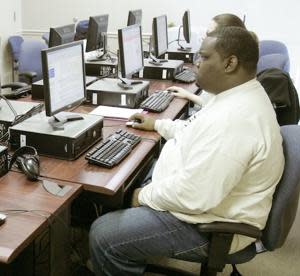 The Lookout
The LookoutReluctant slackers: economy leads young Americans to put adulthood on hold

The slackers of the 1990s are remembered as listless MTV watchers and basement dwellers who opted out of America's striving, mercenary ethos. Many young adults today look similar at first glance. They're in their 20s or early 30s, they don't have jobs or spouses, and many live with mom and dad. But that's not by choice.
This generation of reluctant slackers is eager to get started building careers, owning homes, getting married and having kids. They have put their lives on hold, though, thanks to the bleak economic climate.
"I feel like a failure at times," Shatoria Smith, 26, told The Lookout.
Since graduating from college in 2007, Smith has been living with her parents in Royal Palm Beach, Fla. In early 2008, she was laid off from her job with the local school district thanks to budget cuts, and since then has been looking unsuccessfully for full-time work--while getting an MBA that has been of little use.
Smith said her job woes have affected other aspects of her life. "All my friends I went to school with, they're getting married, they're having kids," she said. "I've had several guys want to go out with me … but I don't feel like I'm good dating material … I don't wanna feel like I'm getting into this relationship and I'm mooching off them."
It's not just her personal life that's stuck in neutral. Florida was hit hard by the housing bust, and Smith said there are plenty of foreclosed properties in her area that are for sale at low prices. "I would love to buy a home or a condo," she said, "but I can't."
Smith's experience is far from unique. She first contacted The Lookout in the summer, after we asked readers to share their stories of being out of work. That young people have been among the hardest hit by the jobs crisis has been well-publicized. Statistics suggest that the dismal employment picture is leading an increasing number of people in their twenties and early thirties to put off taking the steps that for decades have defined the transition to American adulthood.
This year, 5.9 million Americans between the ages of 25 and 35 lived with their parents, according to Census Bureau data. That's an increase of 25 percent from before the recession. And between 2007 and 2009, the share of Americans living in a multi-generational household shot up by 4.9 million, or 10.5 percent, a Pew study found. Most of those households, like Smith's, included two adult generations.
In addition, the share of Americans between 25 and 35 who have never been married has spiked, from 41.4 percent in 2006 to 46.3 percent in 2009.
The age of first marriage has been increasing for decades, especially among more educated Americas. But Mark Mather of the Population Reference Bureau, who has studied the data closely, said that's not what's happening here. Over the last few years, he said, rates for more educated groups have remained stable, while rates for those with less schooling have dropped significantly. "I think the recession is playing a role," Mather said.
Young men, who make up by far the majority of Americans who live with their parents, are more than twice as likely as young men in other living arrangements to be unemployed, and they're also significantly more likely to have not attended college.
But even young Americans who haven't been forced to move back in with Mom or Dad have found themselves stuck in a holding pattern. Jill--she asked that her last name not be used--moved from Austin, Texas, back to her hometown in Arkansas after receiving a masters degree in literature last year. She has been unable to find a teaching job. At 30, she's living in the empty house of her grandparents, who recently moved into a nursing home. She helps maintain it in lieu of paying rent. She told The Lookout she has now received a license to serve alcohol, and plans to move back to Austin to find a waitressing job. (Like Smith, Jill first contacted The Lookout this summer.)
Jill's long-term boyfriend, also unable to find work, moved back home to Houston, where, despite a masters degree, he's thinking about taking a job at Walgreen's. They've talked about marriage, Jill said, but "we can't even get an apartment together right now."
Jill said she'd love to own a home -- "somewhere I could paint the walls whatever I wanted" -- but she can't take on that much responsibility right now. "It's not part of my future plans to purchase a house, because everything is so crazy and up in the air right now."
The same is true of even bigger responsibilities. "What would I do if I had a kid right now?" she asked. "I couldn't take care of it."
"I've kind of lost hope in the American Dream," she said.
As for Smith, she said that one of the hardest things is feeling like she's a burden on her parents.
"I know that they probably thought I would be on my feet by now, where I could take care of my expenses," she said, adding, "It's hard trying to keep my head up and stay encouraged."
Other popular Yahoo! News stories:
• Note to principals: Do not design your own pot sting
• Obama pressures Republicans, Congress to pass Jobs Act
• Iran nuclear envoy borrows handy nearby chair -- of Israeli delegation
